For the past several decades, little in my life as a professional pianist has been as constant as my relationship with Beethoven. It has been intense, immersive, impassioned, hugely demanding and hugely enriching. In the current season, though, it has become something it never was before: exclusive.
Let me explain. Like any serious piano student, I first began to work on one of Beethoven’s piano sonatas around the age of ten. From that point on, the work has never stopped. Beethoven’s music, in addition to its mastery, beauty and spirituality, has a force of personality perhaps unequalled by any other artist’s work in any medium or any era. For decades, he produced a steady stream of work that is by turns monumental, tender, metaphysical, uproarious and consoling — despite contending not only with deafness, but also with alcoholism, digestive problems and raging misanthropy. He was able to do so on account of an insatiable need to be heard, to express himself through music. It is that need I feel when I listen to his music, and that makes playing him seem like a matter of equal necessity.
This might sound like enough — enough work, enough fulfilment — for one person in one lifetime. But like most pianists, I am greedy. And thus, for the past 30 years, as I took in the Beethoven sonatas, I concurrently played Mozart’s piano concerti, with their kaleidoscopic, Shakespearean insight into humanity. I also played Schubert’s sonatas, massive essays on solitude; Schumann’s solo works, windows into his fragile, beautiful soul; the stunning aphorisms of Kurtág; and so much more. In spite of Beethoven’s magnificence, I saw no reason to choose.
This year is different. Having spent nearly ten years recording Beethoven’s sonatas, I am now performing them all in a nine-month period. This is, no matter how long one has prepared for it, a fairly ludicrous amount of repertoire to be playing: 32 sonatas, each remarkably unlike the other 31 in shape, character, language and even the physicality required to tackle it (which, of course, is why playing the lot of them feels so deeply worthwhile). In deference to the magnitude of the undertaking, I am playing virtually no other music this year.
I am only a few months into this crazy endeavour but it has already proved overwhelming in ways both expected and unexpected. It did not come as a surprise that taking on an enormous body of music as intense and as challenging as Beethoven’s sonatas — and that has meant so much to me for so long — would bring with it a massive sense of responsibility. To play music of such staggering quality is a joy and a privilege. It is also, to be honest, a burden.
What I did not anticipate was how extreme the experience would be, thanks to the nature of Beethoven’s music itself — and, maybe even more significantly, to the nature of all the other music that I love which is temporarily missing from my life.
That force of personality in Beethoven’s music is the result of a once-in-history level of compositional talent coexisting with a once-in-history level of stubbornness (or, to put more positively, idealism). This stubbornness — this refusal to accept things as they are, this will to imagine things as he wishes they were — is the greatest gift that comes from living full-time with Beethoven, and also the greatest source of frustration. It is the source of his ability to conjure the infinite, as he does in the finale to the Waldstein sonata; of the dialogues with the cosmos that one finds in slow movements as early as the sonata Op. 2 No. 3 and all the way through to Op. 111; and of the life-affirming euphoria that comes at the close of Op. 110, just moments after an arioso whose despair seems bottomless and inescapable.
Just as often, this stubbornness causes Beethoven to bang his head against the wall — and we, the players and listeners, have no choice but to bang ours right along with him. This is the Beethoven who repeats the same F-sharp major chord for 33 consecutive measures in the Pastorale sonata, otherwise among the most benevolent of his works. It’s the Beethoven who asks the pianist to do things, such as make a crescendo on a single note, that he knows full well are impossible. It’s the Beethoven who thought it wise to base the Hammerklavier’s nine-minute fugue on a subject that evokes nothing so much as a rabid dog chasing his own tail. Again: Beethoven does not do acceptance, Beethoven never lets anything go.
One day recently, when I was feeling particularly assaulted by all the bloody-mindedness, when Beethoven’s teeth–gritting was making me grit my own more than I thought was good for me, I sat in the most comfortable chair in my house and listened to ‘Soave sia il vento’ from Mozart’s Così fan tutte. I have long considered this trio — sung by the sisters Fiordiligi and Dorabella, along with Alfonso, the opera’s puppet master — to be three of the most sublime minutes of music ever written. It expresses the most profound human feelings while remaining, on the surface at least, imperturbable. It was precisely what I craved at that moment.
I’m not sure, however, that it was the music’s beauty — sensational though it is — which meant so much to me. I think what so moved me, perversely, was the absence of idealism. Leaving aside Così’s odious gender politics, the fact is that these two women are dopes. Equally dopey are the two men they are pining after. People, Mozart knows, are dopes. Nevertheless, they love deeply, hurt deeply, laugh deeply. They live deeply, in spite of being so flawed, frail and silly. Even the opera’s title communicates this: that’s how they all are. It is a verbal shrug.
As I listened to ‘Soave sia il vento’ that day, I marvelled that humanity could produce something so deep and pure and true. I sighed and, at one point, shivered with every harmonic twist and turn. When it was over, there were tears in my eyes.
It was just what I needed. Having received the gift of reality as distilled by Mozart, I was ready to return to unreality, as dreamed by Beethoven. I went to the piano and began to play the opening of sonata Op. 109, and felt an intense gratitude, not even to be able to play it, but to co-exist in a world with it. A three-minute respite had been enough. Beethoven’s intensity, no longer oppressive, was once again the greatest blessing of my life.
Got something to add? Join the discussion and comment below.
Get 10 issues for just $10
Subscribe to The Spectator Australia today for the next 10 magazine issues, plus full online access, for just $10.
You might disagree with half of it, but you’ll enjoy reading all of it. Try your first month for free, then just $2 a week for the remainder of your first year.














Comments
Don't miss out
Join the conversation with other Spectator Australia readers. Subscribe to leave a comment.
SUBSCRIBEAlready a subscriber? Log in